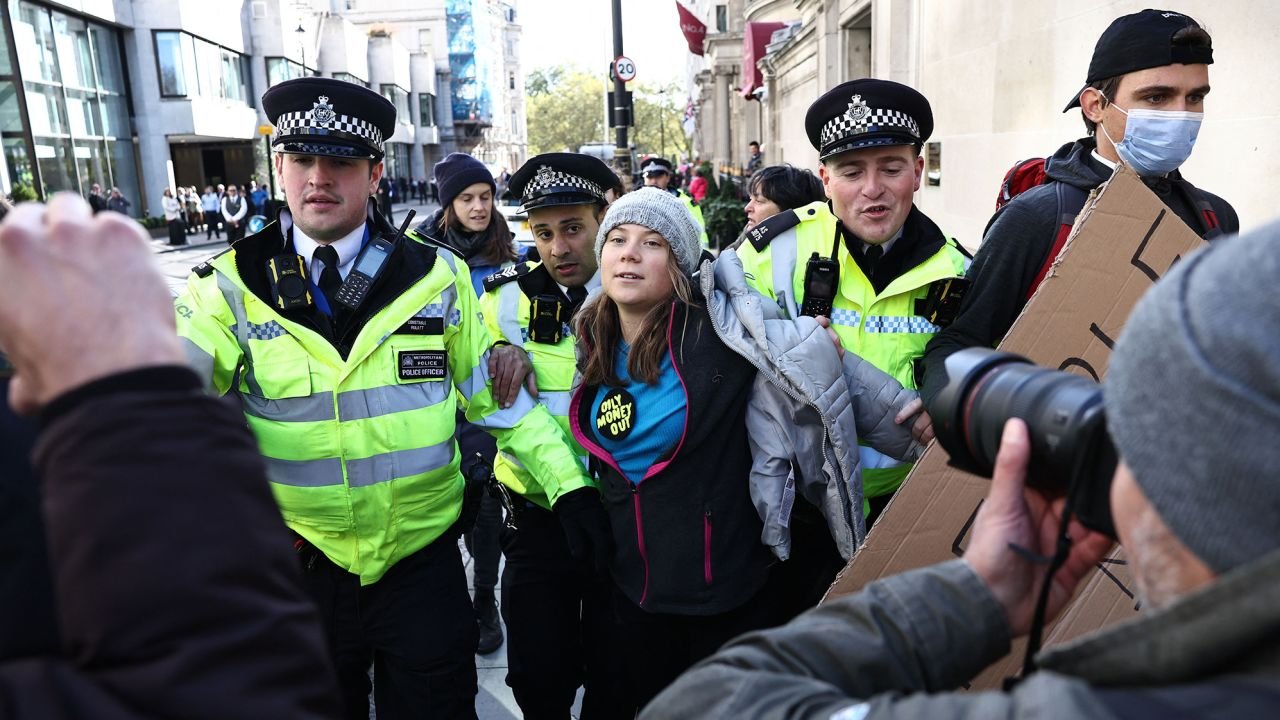Greta Thunberg Arrested at London Oil Summit Protest

Greta Thunberg, the Swedish climate activist, was arrested on Tuesday at a protest outside a major oil and gas industry conference in London. The protest was organized by the group Fossil Free London, which is calling for an end to fossil fuel production and investment.
Thunberg was among dozens of protesters who gathered outside the InterContinental Hotel, where the Energy Intelligence Forum was taking place. The conference attended by CEOs and executives from some of the world’s largest oil and gas companies, as well as government ministers.
Protesters chanted “oily money out” and sought to block access to the hotel. Thunberg arrested and taken to a police station before being released overnight. She has charged with breaching a public order offense.
Thunberg’s arrest has drawn widespread attention to the protest and the Fossil Free London campaign. It has also sparked a debate about the role of civil disobedience in the fight against climate change.
Some people have argued that Thunberg’s arrest was an infringement on her right to free speech and protest. Others have defended the police action, arguing that it was necessary to maintain order and prevent violence.
Thunberg’s arrest is the latest example of her commitment to raising awareness of climate change and demanding action from world leaders. She has become a global icon for the climate movement, and her arrest is likely to inspire further protests and activism.
 Greta Thunberg, the Swedish climate activist, arrested on Tuesday
Greta Thunberg, the Swedish climate activist, arrested on TuesdayBackground on Greta Thunberg
Greta Thunberg is a Swedish environmental activist who has become a global symbol of the climate movement. She first gained attention in 2018 when she began skipping school on Fridays to protest outside the Swedish parliament building. Thunberg’s activism has inspired millions of young people around the world to take action on climate change.
Background on the Energy Intelligence Forum
The Energy Intelligence Forum is a major annual event that brings together oil and gas executives, government officials, and investors. The EIF known for its high-profile speakers and its closed-door sessions. Critics of the EIF say that it is a forum for the fossil fuel industry to promote its interests and to undermine efforts to combat climate change.
Reactions to Thunberg’s Arrest
Thunberg’s arrest has met with mixed reactions. Some people have defended her right to protest, while others have criticized her for disobeying police orders. The arrest has also raised questions about the role of civil disobedience in the climate movement.
Thunberg’s supporters say that she is a courageous activist who is fighting for a just cause. They argue that she has a right to protest peacefully, even if it means disobeying police orders. They also say that Thunberg’s arrest is a sign of the desperation of the fossil fuel industry, which is trying to silence its critics.
Thunberg’s critics say that she is a reckless attention-seeker who is more interested in getting headlines than in making a real difference. They argue that she should respect the law and that her civil disobedience tactics are alienating potential allies. They also say that Thunberg’s arrest is a distraction from the real work of addressing climate change.
Conclusion
Thunberg’s arrest is a significant event in the climate movement. It has sparked protests and debate around the world, and it has raised important questions about the role of civil disobedience in the fight against climate change. It remains to be seen what impact Thunberg’s arrest will have on the climate movement, but it is sure to be a topic of discussion for many years to come.

- Art
- Causes
- Best Offers
- Crafts
- Dance
- Drinks
- Film
- Fitness
- Food
- الألعاب
- Festival
- Gardening
- Health
- الرئيسية
- Literature
- Music
- Networking
- أخرى
- Party
- Religion
- Shopping
- Sports
- Theater
- Wellness



